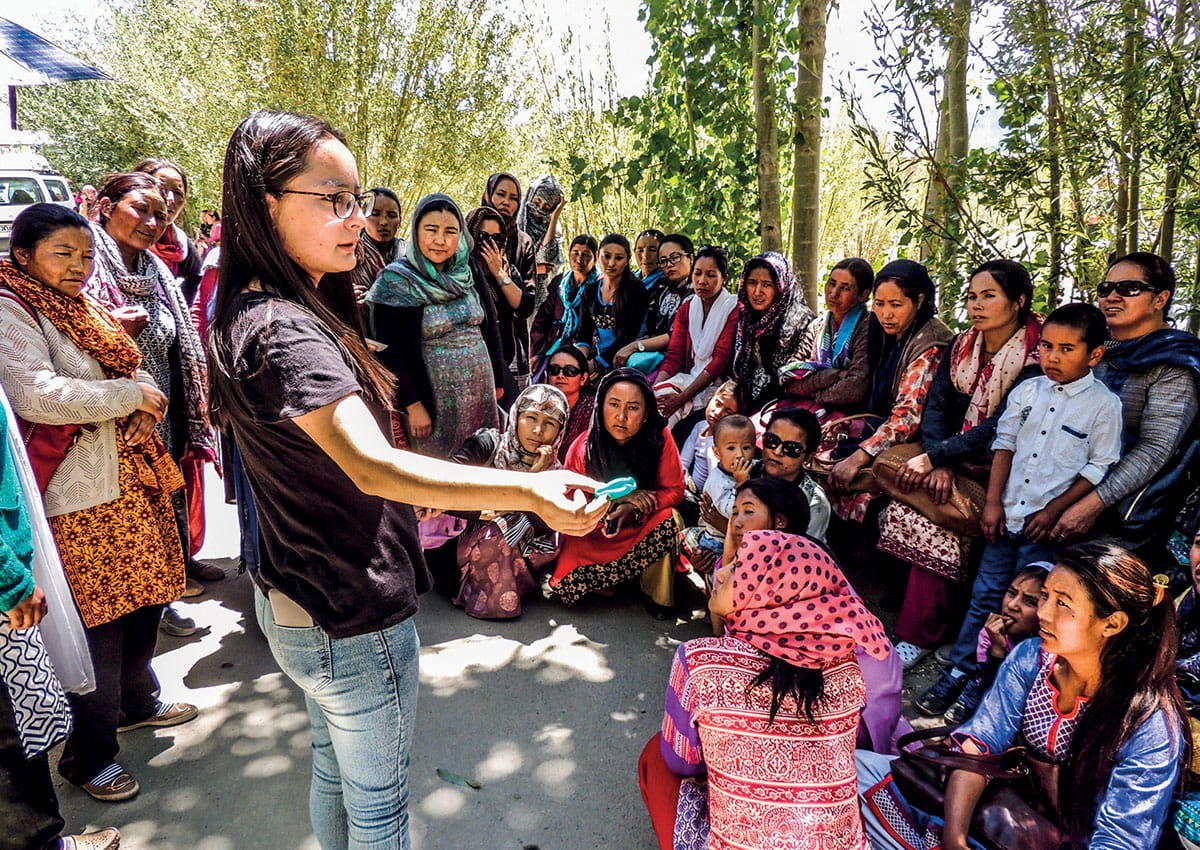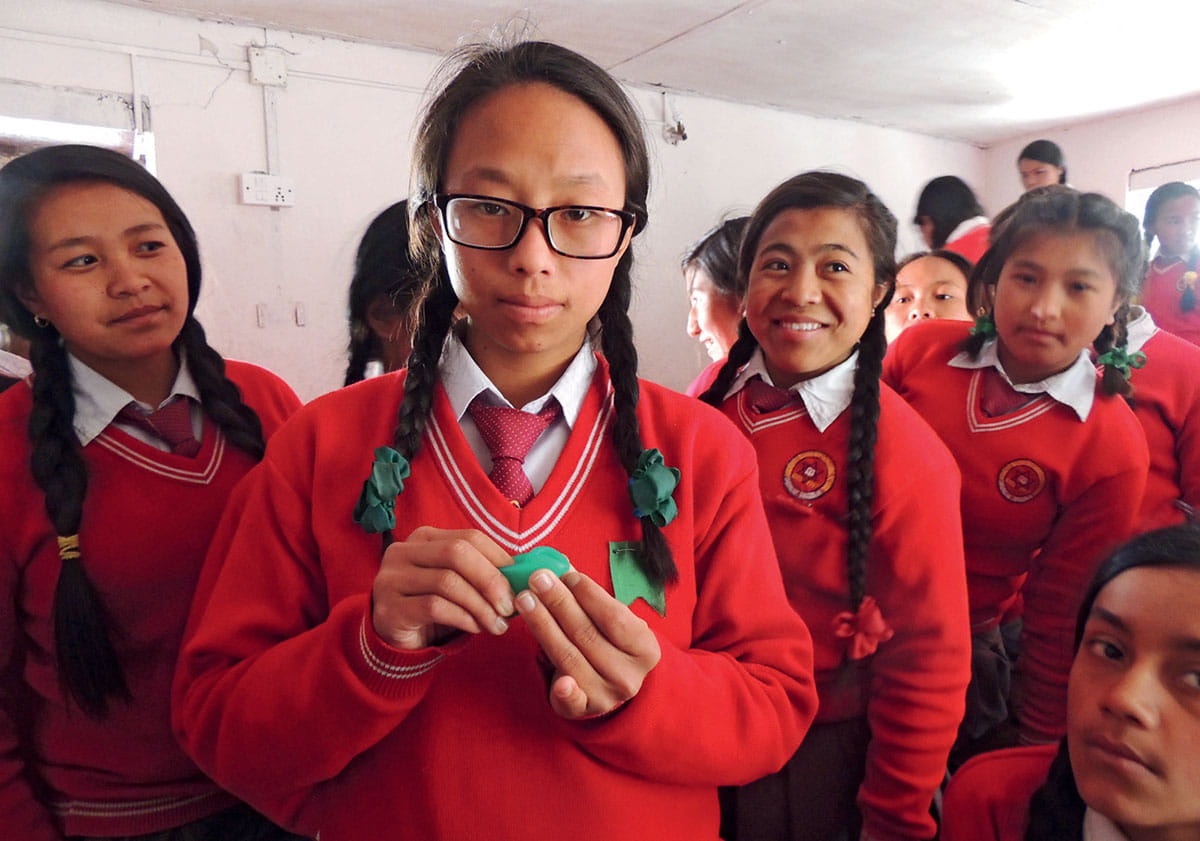Stories > Combating Taboo
Combating Taboo
Freedom Cups is a Singapore social enterprise that aims to improve the well-being of women around the world who don’t have access to proper sanitation facilities.

Explaining the benefi ts of using menstrual cups to women in Ladakh, India.
BY CORINNE KERK
PHOTOS FREEDOM CUPS
lthough menstruation is a universal female experience, it is addressed differently around the world. It is often just a monthly hindrance for women in countries like Singapore, but for those in other countries, it is an issue that can affect their participation at school, at work and in social activities. These women often do not have access to clean toilets with running water or lack the means to buy sanitary products. In some societies, menstruating women suffer the social stigma of being considered unclean. It is considered taboo for them to perform activities like praying or cooking.
The plight of these women across the globe spurred Singaporean Vanessa Paranjothy, 28, to give up her recruitment company business and set up a social enterprise in September 2015. Called Freedom Cups, the company distributes menstrual cups made of medical-grade silicone to women in these countries.
A menstrual cup is a small cup that is inserted much like a tampon and sits at the base of the cervix collecting menstrual fluid. It requires just a little bit of soap and water to clean out, and provides a sanitary and leak-free solution to women. This means women and girls using them can go to work or school with peace of mind.
Menstrual cups are not new, but what separates Freedom Cups from others is its buy-one, give-one scheme. This means that for every cup purchased from its website or retail outlets that carry them, a cup will be given to a woman in an underprivileged community in the developing world. Each cup, which costs S$30, holds about 18ml of fluid and lasts an average of 10 years. This also reduces waste in the form of pads and tampons.
So far, Freedom Cups has distributed some 1,500 cups through a total of seven projects in the Philippines, Cambodia, India and even Singapore, in which the team met trafficked women and abused domestic workers under the care of non-governmental organisation Humanitarian Organisation for Migration Economics.

During a visit to Nepal in March this year, the team distributed menstrual cups to teenage girls in the town of Dhunche.
Freedom Cups is also completely self-funded, so Paranjothy and her team – comprising one full-time staff, two part-timers and three regular volunteers – stage all their projects themselves, going down to the ground and looking for locals to help set things up and invite women from the villages to their sessions. It chooses its outreach destinations based on need. Says Paranjothy: “As we are small and have limited capacity at present, we go to places where the need is dire. These are places that have no electricity, no running water, and are remote.”
EMPOWERING WOMEN
Distributing the Freedom Cups themselves also gives the team an opportunity to empower women by educating them about how to manage their menstrual cycles with dignity and without discomfort or fear. She says: “We teach women about their bodies and their periods objectively, and do so in an open and comfortable way.
We teach them that it is not something dirty or shameful, and it is in fact natural, healthy and beautiful. We then give them a better and easier way to deal with their periods in the form of the menstrual cup.”
“We teach women about their bodies and their periods objectively, and do so in an open and comfortable way. We teach them that it is not something dirty or shameful, and it is in fact natural, healthy and beautiful. We then give them a better and easier way to deal with their periods in the form of the menstrual cup.”
Vanessa Paranjothy, founder of Freedom Cups
The team also makes sure to take into account religious and cultural sensitivities, as well as differences in economic and educational backgrounds. Paranjothy says: “We went to the Philippines first to see how a predominantly Catholic society might react to the cups, and then we went to Cambodia to see how a more Buddhist society would react to them. We envisioned that women in [different circumstances] would all react differently and have different levels of educational needs. So for the past year, we have been trying our best to shape our curriculum to empower women and destigmatise their sexual and reproductive health.”
The women tend to start off wary, she says. Although some have access to cheap sanitary napkins, many are accustomed to using old cloth, and others even share rags. “They have never heard of tampons, and have absolutely no idea what their reproductive systems look like, or why they bleed,” she adds. However, Paranjothy and her team had few problems engaging these women. They found them to be level-headed, practical and united in their goal to find a solution to their problems. The main sensitivity is the notion of virginity, which was dealt with by being objective and answering questions scientifically.
The team typically spends five to seven days in each village. During a session, any woman having her period tries the cup, sometimes with a volunteer providing step-by-step instructions from outside the bathroom. The response is usually very positive, and her experience is shared with other women, who also try the cup. As more attest to the benefits of the menstrual cup, they ask the team for more for their daughters and friends.
Paranjothy says the feedback from women who have used the cups has been very encouraging. They are happy using it and are talking about it among their friends. They now report fewer common yeast and urinary tract infections, and have been able to work longer hours, without having to worry about bleeding onto their clothes. They no longer have to wash and dry dirty rags in secret as well. Younger users are also more comfortable at schools ill-equipped with toilet facilities during their periods.
In one of its projects in Ladakh in the Indian state of Jammu and Kashmir, Freedom Cups teamed up with nine doctors and six nurses from nongovernmental organisation Himalayan Health Project. Over 4½ days, they saw about 1,600 women from the region. The medical team screened the women for cervical cancer while Paranjothy and her team taught them about their periods and distributed menstrual cups.
Freedom Cups is also tapping the expertise of a team of Singaporean gynaecologists to finetune its curriculum. Says Paranjothy: “We will have them weigh in on our curriculum and incorporate their views into it.” But the mission she set out with is nowhere near complete, says Paranjothy, who recently travelled to Nepal in March this year with her team.
There are more projects in the pipeline to broaden Freedom Cup’s reach. She says: “We are in the midst of setting up a project with refugees in southern Europe. We hope to return to Ladakh in India, and Bacolod in the Philippines. We also have projects in the works to help the urban poor in Singapore, the homeless in Kuala Lumpur, and villages in Java, Indonesia.”
